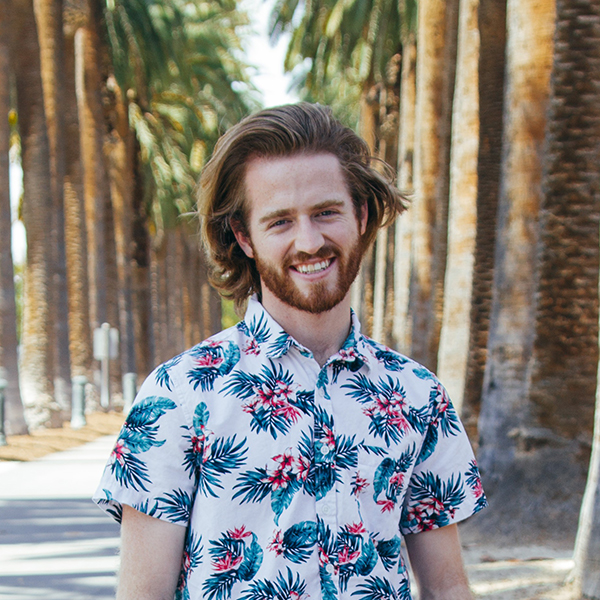
"My professors cared about what I thought. They gave me a voice in classes, and showed me that I could be a leader. I found the freedom to ask my dumb questions and my hard questions."
Quick Facts
Program: B.S. in Biomedical Engineering
Minor: Global Justice
Graduation Year: 2017
Current Job Title: Graduate Student
Hometown: San Diego, CA
Current City: Baltimore, MD
Life at CBU
Why did you choose your major? What interested you in this particular field of study?
I knew I wanted to study engineering because I always loved problem solving. I chose
to study biomedical engineering and global justice because I felt that with that combination
I could learn the tools to make an impact on people’s lives through public health,
while also gaining the ethical thinking and social understanding to know where and
how to apply my efforts. I have since learned about health disparities and the broken
nature of a health system married to profits, and hope to spend my life working to
rectify these injustices through thoughtful innovations, step by step.
What did you like about being in this program at CBU?
My professors cared about what I thought. They gave me a voice in classes, and showed
me that I could be a leader. I spent many hours sitting in my favorite professors’
offices, sometimes discussing ethics, engineering problems, and life challenges. And
possibly most important, the closeness of my cohorts, in BME and global justice, made
the four years of ups and downs truly wonderful.
What did you think about your professors?
My favorite professors were always open to talk, which made the classroom experience
very relaxed and much easier to learn. I found the freedom to ask my dumb questions
and my hard questions. Of course, not all professors made me feel that way, but the
ones who did made all the difference.
Did you complete an internship?
I did two internships, one at Glysens Inc. and one at the National Institutes of Health.
At Glysens, a company developing an implantable continuous glucose monitor, I discovered
how I loved fast-paced environments, and the confidence that I can produce work that
matters to an engineering company. At the NIH, I learned about health disparities
in the United States while working in a vector molecular biology lab focused on vaccine
development for Leishmaniasis, a neglected tropical disease with significant disease
burden outside the United States. These internship experiences were indispensable
for my academic and career development.
Did you participate in anything else at CBU?
I was a part of the BMES chapter on campus, some programs focused on poverty alleviation,
and rock climbing.
How did you grow (spiritually, socially, educationally) while in this program at CBU?
Dr. Key taught me to delve into philosophy and love a faith tradition that was deeply
progressive. Dr. Kim pushed me into abstract problem solving from day one in Intro
to Bioengineering I, all the way through the end of his Neural Engineering course
in the Spring of Senior year. Dr. Stumpf taught me possibly the most important messages
of all, that people from polar opposite viewpoints can engage in passionate arguments
that are simultaneously critical, humble, and honest.
Did your major help you figure out your purpose?
Steve Graves has often asked the question, “What do you do now with what you know?”
What I know now is that the health system in America is inadequate for serving the
whole population, disparities in health span economic standing, skin color, and geography,
and Jesus followers are to act as his ambassadors to this hurting world. So I would
say that I am learning more every day what my purpose may be.
Life after CBU
What have you done since graduating?
I am attending Johns Hopkins University for Master of Science in Engineering at the
Center for Bioengineering Innovation and Design. As a part of my studies, I spent
the summer of 2017 performing ethnographic research in Johns Hopkins Hospital to find
worthy problems to focus on for my master’s. I performed similar research in Brazil
in 2017 exploring potential for citizen involvement in prevention of mosquito-borne
disease. Since then, I have been working on two projects: one focused on automating
mosquito surveillance, and another focused on improving the value of the first-round
of cancer biopsies.
How has your major and time at CBU prepared you for your life and career after college?
I have learned to love those I disagree with and disagree with those I love. I found
that the best community is not made up of homogeneous groups. And I learned that the
Creator makes beautiful people diverse in heart and mind. Academically, I learned
how to be proactive, think critically, and problem solve both creatively and methodically.
How are you making a difference in the world? How are you living your purpose?
I am working to improve the quality of care for lung cancer patients (lung cancer
is one of the leading causes of death in the world). I am also working to improve
mosquito surveillance techniques to improve the way health systems attempt to prevent
disease outbreaks.
Would you recommend CBU to others?
I would recommend people to go if they are looking for a Christian context for education.
In that, I would recommend them to embrace community and question simple answers.
The world is beautiful and complicated.

